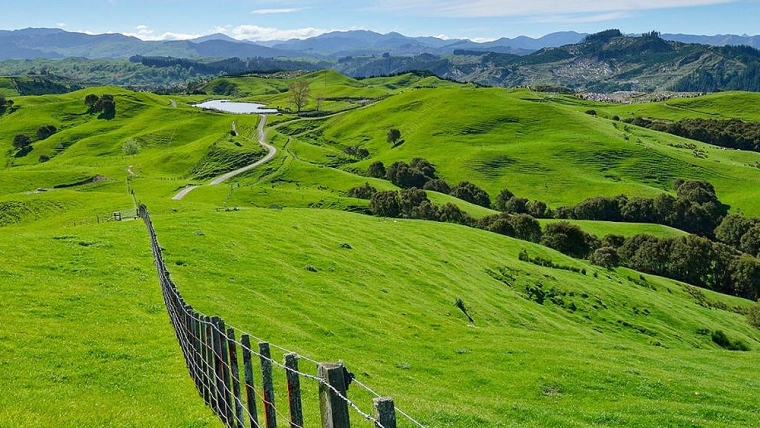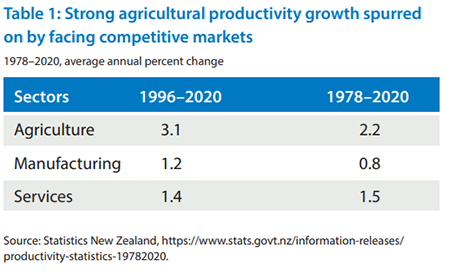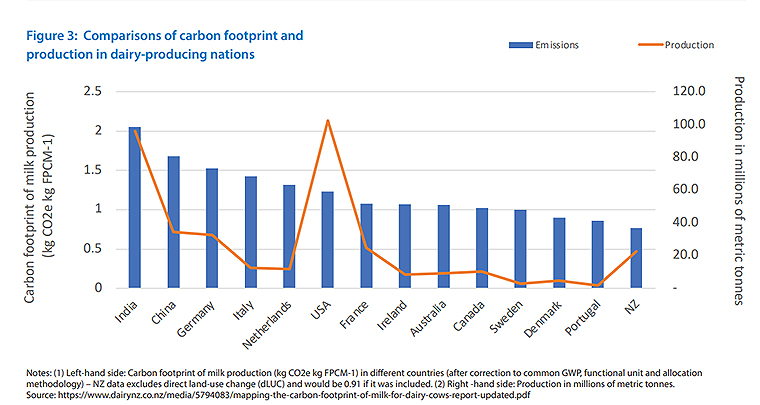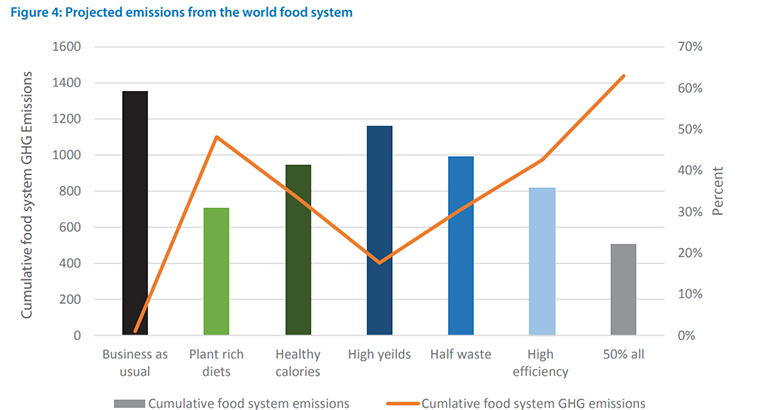
There is perhaps a little irony in that the same week Rabobank put out their ‘white paper’ “Steering into Food Transition” rethinking the climate change challenge for New Zealand food and agribusiness, the Groundswell movement were having a protest driving tractors over the Auckland Harbour bridge. With only 10 tractors in the convoy the ‘protest’ probably failed to achieve the profile expected or desired.
It is perhaps a little unfair to say Groundswell are reluctant to move into the 21st century (already 2 decades into it) but the Rabobank document is certainly forward looking and thought provoking.
In a section headed “Check your mindset” the authors challenge farmers to accept change is coming if not already here “Climate change is coming and so is government regulation and consumer demand for farmers and growers to produce more food in a transparent, socially and environmentally responsible way”.
The central theme of the paper is that agriculture needs to feed many more people while having a reducing carbon footprint. When it comes to production, they have shown that agriculture is carrying the country.

However, there is also a reminder that New Zealand has the sixth highest carbon footprint per head of capita in the Annex 1 (Developed) countries and largely because of our agricultural involvement. The conflict is that despite that ‘we’ are among the most efficient at what we produce with the dairy graph below an example of this. It is doing this and achieving carbon reductions that is creating the headache.

Quoting international studies, they highlight that between 2010 – 2050 world food supplies need to increase by between 35 – 56% and this in a global environment facing more and greater production constraints between climate extremes and political uncertainties.
It would be easy under these scenarios to argue that agriculture should be outside of any carbon reductions targets and be allowed to operate as a business as usual model. However, if a BAU model for all agriculture does persist globally then agriculture by itself would be responsible for taking global warming up to +2c temperature by 2050.

They point to a number of things that can be done to improve the status of agriculture from stepping up technological change, better training and reduced waste.
They also move into the fringes of the forestry debate without taking a firm stance but advocate for “responsible offsetting”. I wonder how they would view today’s news that the large East Coast farm sales (Matanui and Huiarua stations) have been approved by the OIO. Given that there is meant to be a net benefit to society from these sales for them to be approved and among other impacts it will mean closing a school and depriving the East Coast of yet more population the OIO must assume the benefits of carbon sequestration trumps food and local populations.
An irony here is that among the new ownership is IKEA which have been implicated in unsustainable logging in Eastern Europe. Anyway, I digress. It will perhaps come as some relief to those dairy farming that a USA study quoted in the Rabobank report suggests that removing dairy from the agriculture picture would only globally reduce (agriculture) emissions by between 6.8 -12% and given the release of another paper showing how plant based milks are “nutritionally risky” when compared to animal milk it does show that we need to remind ourselves that there are benefits that come with dairy milk.
As much as farming, banks also strongly dislike uncertainty and with increasing impacts from climate extremes they do recognise that government has a role in shaping the regulatory environment and through it all there will be some farmers who will exit the industry willingly or otherwise. Rabobank are taking a role in the changes required to move into the new paradigm with incentives in lending and trying to help remove bottlenecks in the way of innovation. Given they are a specialist agricultural bank their input into how they see the future is relevant and should be taken note of.
Dairy prices
Select chart tabs
34 Comments
As your figure 3 demonstrates, the world could make a giant step forward in reducing dairy emissions by cutting India's herd dramatically and opening up their industry to global trade.
India's small farm subsidies & tariff protectionism is at least as hypocritical as the EU & USA.
A giant step forward into what?
How does it work for small-scale Indian farmer who grazes their cows on common land and road verges to get rid of them and import dairy? So how do they now pay for this once their income is gone?
The only way to cut cows in India,would be to stop breeding them , they won't kill cows. I would think a policy to reduce cow numbers would be politically impossible.
A very interesting interview Kim Hill had on RNZ this morning about 'the problem with pastoral farming'. The interview starts at the 5:30 mark.
Hmmm - interesting, but energy-blind.
Artificial food via lab via fermentation via hydrogen via electrolysis from renewable energy?
Yet we doesn't say how many acres of renewable capture are required.
The problem is the old one; we are eating our way through fossil fuels (as applied to food; at least 10:1, more like 20-plus:1, calories to calories) and we need to prove we can do without. He needs to prove the energy-demand of the renewable infrastructure, take into account the terrible EROEI of hydrogen, dah de dah....
It was a good interview. The hard reality is that industrial scale dairy and meat farming is incompatible with meeting our food needs whilst protecting / restoring our ecosystem. NZ is increasingly seen as a pariah - things are changing much more quickly than we expected.
Her research before an interview is unsurpassed, and something many far younger interviewers could learn from.
The problem is that as soon as people have finished tarring Groundswell with the far-right conspiracy theorist brush, they'll be off down the supermarket aisles complaining about the price of cheese (and probably blaming Putin for it or something).
Current farming practices are unsustainable and need to change, but that change comes at a price. Just like we can't run modern industrial society on renewable energy, there's no way to maintain current western diets without destroying the environment (and our bodies) in the process. Transitioning away from these things is going to involve major, probably very uncomfortable changes to the way we live our lives. We are not going to be able to carry on with business as usual in a "greener" kind of way, despite what the politicians would have you believe.
The real price is, we all need to eat far less meat and dairy.
I saw Kim Hill interview George Monbiot today on this exact subject, and he suggests that if everyone ate like a NZer, we would need another planet in order to feed everyone:
https://www.rnz.co.nz/national/programmes/saturday/audio/2018857285/geo…
You are dead right we need to start eating less meat and dairy, but you'll never see a politician stand up and say that in front of a bunch of Kiwi voters. So instead, we get carbon credits and climate emergency declarations.
Spot on
Or just less of us eating?. Again the politicians never seam to talk about population size as an option.
In the context of reducing carbon emissions , that would mean culling the richest , fattest humans.
Meanwhile the tv news is all abuzz about the restart of tourism both in and out-bound. Followed by jet boat fun in queenstown. It comes down to burning fossils in pursuit of personal pleasure. Yet not once was the paradox of carbon footprint mentioned. When the subject of agricultural food production comes up, the damage to the environment by cows mainly and the GGEs are the first things raised seemingly. Oh but we can't say anything about the urbanites activities. Is it because it would also affect those who present the news and they would then feel guilty having their overseas escapes.
There is no feasible nutritional replacements for meat and dairy. We would be less healthy if we stopped eating them and even more food would have more components produced in an industrial plant. It's possible but not reasonable for a nation to become veterinarian but not vegan.
Plant "milk" without fortification is poor quality plant nutrition and with fortification is still not close to milk. There are missing amino acids that could get from meat but ...
In reverse, I think there is an argument that milk and cheese can replace meat consumption (1/3 India) but I don't think this is optimal for everyone.
There is anecdotal evidence of healthy veganism but this seems to be a transitory phase and not from birth to 90 years old. Could we just eat less? maybe but I think the population would chose to replace it with things that are worse for their health or you are just forcing partial veganism on everyone.
The banks are warning their rural borrowers of what's coming. Rabo is European so wait for the full weight of Paris accord cuts to be rolled into lending rules - it's coming I can assure you. ESG etc is forcing the others as well.
This report is code for change or be left behind. Its not always right and can feel very unfair on the farm but the banks have to do this or face bigger political, social and business problems and their profits come first for them.
You can die in the trench or look for opportunity. The world won't care.
Hydrogen is incredibly inefficient to produce so will be reserved only for essential items.
"As much as farming, banks also strongly dislike uncertainty and with increasing impacts from climate extremes"
Increasing impacts from climate change that saw record crop production in cereals in 2021 and only a 1.4% decrease predicted for 2022 to make 2022 the second highest on record. Roll on more climate change - it has been great for cropping.
...Until you run out of water
Extra climate warmth helps plant growth to 30C assuming there's enough water, then things go backward due to heat stress even if there is water.
Europe has been in the worst drought in 500 years and has severely limited overland water, mostly fed by groundwater.
It may take a few years like this, but when groundwater is gone and there's no available water rights the land becomes worthless for growing.
Let's not be shortsighted here.
Climate change is change of the hydrological cycle. Water is the one to watch closest
Especially where you have rivers crossing international borders. Colorado river into Mexico, Rivers from Iran flowing nito Iraq. The Nile. The problem is the extremes, those areas on the edge will fall over.
I have been saying for a few years the next major war will be over water. A bit out with Ukraine , though access to ports is probably a large part of that too.
I tried to dig some post holes today, the ground is as hard a the middle of summer. Despite the record rain , the warmth has still baked it . admittedly the stock have compacted it , but i was still surprised at its condition. No wonder the grass hasnt taken off with the warmer weather.
How predictable, Another prophecy of doom once the climate change one didn't work out for cropping. Plants have a app for that - as CO2 levels increase water efficiency increases. Hence global greening in the Sahel amongst other unpredicted benefits of increasing CO2. Remember the predicted desertification scare?
"The biggest green elephants in Australia are the five desalination plants built hurriedly around the same time climate catastrophist Tim Flannery forecast that burning hydrocarbons would create perpetual drought.
Climate botherers forgot about La Niña, with its cycles of rain and floods for Australia. These complex and expensive de-sal plants have largely sat idle.
The sun powers the greatest desalination plant on earth, all for free. If we had spent all that desalination money on dams we could have moderated La Niña flood damage, insulated against El Niño droughts, and provided naturally desalinated water for many towns and industries."
...These disastrous Green adventures are driven by the UN Billionaires’ club and promoted endlessly by government media and education bureaucracies, and vocal vested interests.
This plague of Green Elephants will destroy our industries, our farms, and our access to cheap reliable fuels and electricity."
https://spectator.com.au/2022/08/the-plague-of-the-green-elephants/
Not worth replying too
Go on - make some prophecy of doom of something bad that is going to happen in the future if we don't follow your advice. All the cool kids have been doing it for millennia. By the time the data catches up with your prediction you'll be sunning yourself in your beach house or winging it in your private jet. Go for it!
"We cannot absolutely prove that those are in error who tell us that society has reached a turning point, that we have seen our best days. But so said all before us, and with just as much apparent reason. On what principle is it that, when we see nothing but improvement behind us, we are to expect nothing but deterioration before us."
The CO2 - water use efficiency relationship for plants is linear, but the temperature - evaporation rate relationship is exponential.
Does the increase in plant water use efficiency more than compensate for the increased evaporation rates at higher temperatures or during drought conditions? Physics says no.
Increased CO2 concentration is also reducing the pH of oceanic ecosystems, making shelled species less viable and ruining the food chains that rely on them, degrading ecosystem viability and oxygen creation. Oxygen is useful, but with the plants and oceanic photosynthesis struggling, hmmm...
Dams are also useful, but require suitable geology and much energy to make. Where would you propose putting all the dams that would mitigate water woes? And who would pay for the dams to mitigate the 1 in 50, I mean 500 year droughts?
There is also the issue of weather patterns not nicely matching infrastructure buildout. The giant desalination plant concept is not relevant at a district level where all the rain fell 50km up the road and your patch is parched, or you got all the rain and are now trying to bounce back from massive flooding. There's much history on civilisation collapse because of water stress.
One does not need to believe in climate change or support green schemes to know these are big problems with an array of solutions required
"Increased CO2 concentration is also raising the pH of oceanic ecosystems". Really? Perhaps check that assumption.
"Does the increase in plant water use efficiency more than compensate for the increased evaporation rates at higher temperatures or during drought conditions?" Clearly it does else we would be seeing desertification - conversely we are seeing global greening. We are seeing it at global level and at lab level.
"In conclusion, increased CO2 concentrations could raise the WUE of seedling leaves under normal water conditions and drought stress, and this effect was more significant under drought stress. Under severe drought stress, increased CO2 concentrations improved the drought resistance of seedlings by improving their PSII function."
https://www.tandfonline.com/doi/full/10.1080/17429145.2019.1603405
Corrected to more CO2 = reducing pH / acidifying oceans
My point "Does the increase in plant water use efficiency more than compensate for the increased evaporation rates at higher temperatures or during drought conditions?" was not really responded to with any substantiation. Could you please provide some, apart from human intervention? NASA satellites have been documenting desertification for decades. A quick rewind of time layers using google earth will yield similar results.
How does water use efficiency help plants grow if the water has all but evaporated already due to extended drought conditions and greater wind intensity?
In the wet years use the dams for hydroelectric. Then watch as you energy mix becomes increasingly reliant on the water until it becomes useless for water storage.
Or, the price of the water in dry years would be sold at a rate equivalent to the amount of water needed to generate 1MW of electricity
Possible to mass install hydro, but prohibitively expensive to maintain hydro systems at tiny scale in competition with other grid-tied energy sources.
Price of irrigation water at $1/m3 is much higher than energy yield from same volume of water being flushed downstream, unless you have an enormous drop.
Not to mention the displacement of the best flat farmland to intermittent water storage and silting up behind dams
There is some quite intersting ways of storing energy other than stored hydro emerging.
One us R-19 , a fluid 4 times as dense as water , so 4 times less storage area is required.
Another is simply lifting weights up hills , and generating power when needed by lettting it drop back down. Both are more efficent than pumped hydro. Another is dropping weights down old mineshafts. the 2 weight ideas would be idealfor smoothing out the grid, compensating for the varying nature of wind and solar .
https://oilprice.com/Alternative-Energy/Hydroelectric/Underground-Hydro…
On food I don't disagree we are producing more - in fact theres no shortage of food - just a price problem for some - either they can't afford to buy it or they can't get enough for producing it. Some believe the era of decreasing real food prices is over but we will see.
If you take this line of reasoning we shouldnt be worried about any land use change in NZ as there's more than enough food. I had an interesting book given to me by a rural bank a few years ago at a conference and the opening statement in it was that if we reduced food wastage to zero (not possible of course) we already produce enough food to feed the worlds 2050 population. The book then proceeded to talk about the struggles to feed the world in 2050 and how we can ramp up production !! - Does that sound like a good business model?
More and more people are chasing the ones with the dollar as from a business point of view no ones interested in the poor who cant pay (what's new).
Things have got a lot better for a lot of people. You just need to look at supermarkets and the choice we now have - its insane as they get bigger and we have more and more choice but that's the market.
Climate change to me is about liveability for humans in the world, pollution (remember that word!!) for health reasons from fossil fuels, weather events and natural ecosystem destruction.
I can't see the problem in getting rid of pollution that allows us to live healthier lives, trying to keep more of the world liveable and support ecosystems through biodiversity which allows food production to flourish (just be careful being in this game financially). We are doing this to ourselves as nature will just evolve.
How to distribute food etc to all is a political, financial and human nature issue which will never be solved because people are involved.
What are your misgivings around tying profitable food production in with enhancing biodiversity and ecosystems?
None at all. It's simply there is a lot of food and making profit is hard. Just look at the size farm now needed to be profitable.
My grandparents had 1000 sheep and were very profitable 60 years ago. Today you need probably north of 6000 plus.
It's just economics and as real returns have fallen its a harder game.
Heres what nobody wants to say....without population control...all the measures in the jar of measures will count for nothing. You cannot have sustainability without managing the numbers. Its not rocket science...its the elephant in the room everybody wants to ignore....maybe some are hoping a World war will reset the numbers... It doesnt have to happen that way.... but it will require folk to change their mindset . The way folk are concentrated in cities needs to change as well because it creates stressful environments and costs more to alter infrastructure to suit the growing numbers . There are more efficient ways of managing society .... Building high density is just a lazy short sighted answer that creates more problems than it solves...folk cant see the forest for the trees...plenty of land in NZ and we have a population that is low on numbers...We could lead the world and set by example if we focused on being efficient with the way we manage and move the numbers around... It's not too late for NZ...
Quiet ironic the pope calling climate change the number one issue , yet doing nothing to change his organisations rules meaning high population growth in Catholic countries.
but barring one child policies like China had , Education and economic security are the only ways to reduce population.

We welcome your comments below. If you are not already registered, please register to comment
Remember we welcome robust, respectful and insightful debate. We don't welcome abusive or defamatory comments and will de-register those repeatedly making such comments. Our current comment policy is here.